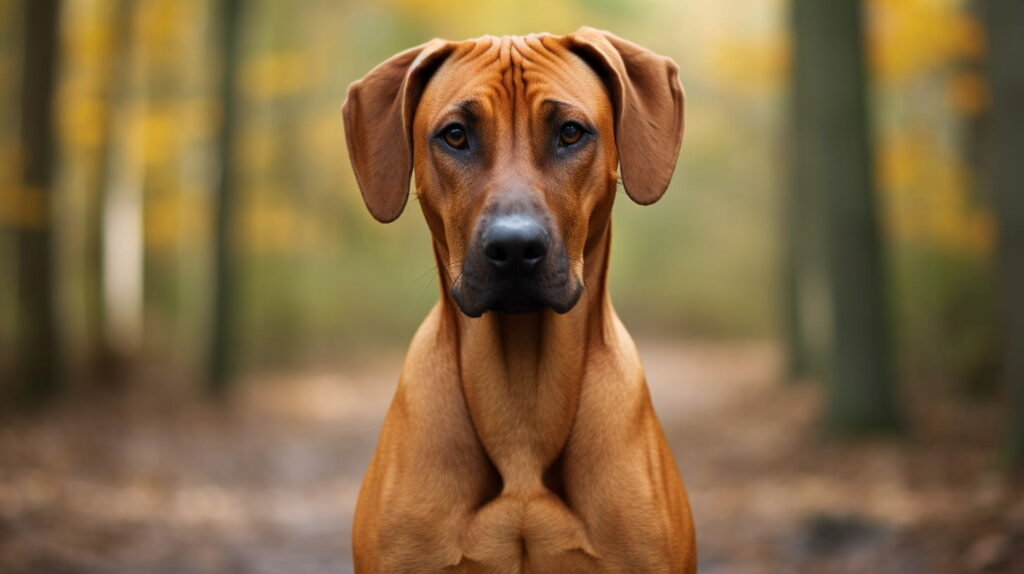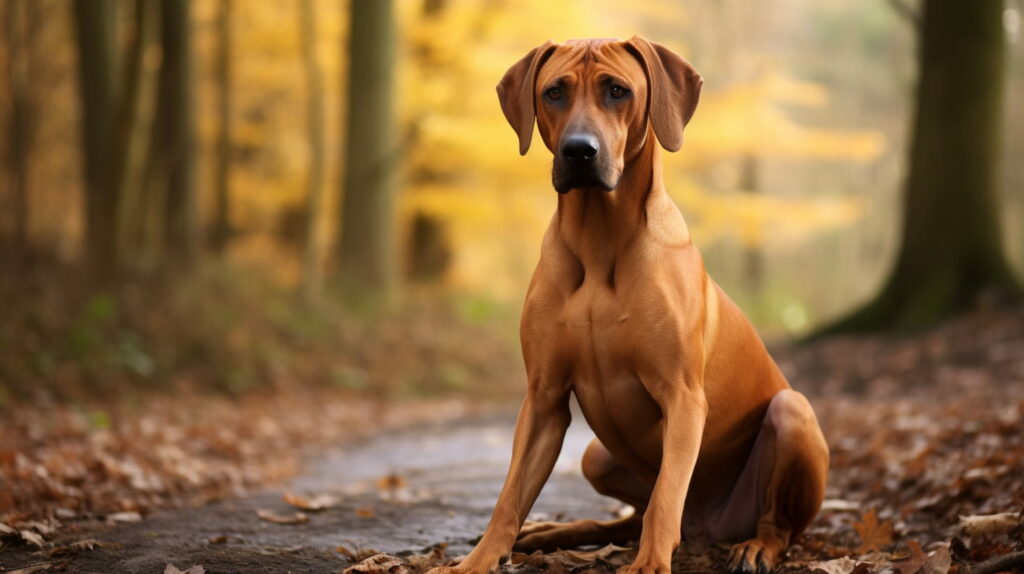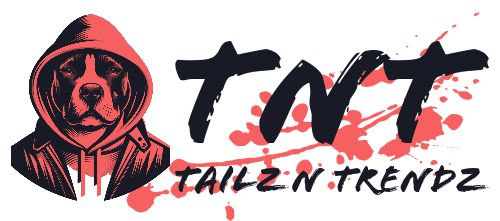Welcome to our ultimate guide for Rhodesian Ridgebacks, the magnificent Hound breed from South Africa. You may have heard of this muscular breed, also known as the "Lion dog," because of the distinctive ridge on its back that grows in the opposite direction of its coat. In this comprehensive guide, we will explore the breed's origin, characteristics, training, grooming, health concerns, and much more to help you determine if a Rhodesian Ridgeback is the right addition to your family.

Key Takeaways:
- Rhodesian Ridgebacks are a Hound breed originally from South Africa.
- They are known for the distinctive ridge on their back, which grows opposite to their coat.
- These muscular dogs are intelligent, loyal, and naturally protective.
- They require regular exercise and mental stimulation to keep them healthy and happy.
- Rhodesian Ridgebacks can make excellent family pets or hunting companions, but they are not suitable for everyone.
A Brief History of the Rhodesian Ridgeback
The Rhodesian Ridgeback is a dog breed that originated in South Africa. It was originally bred by Boer farmers to be a versatile hunting dog capable of hunting large game, such as lions and leopards. The breed was developed by crossing various European breeds, such as the Greyhound and the Bloodhound, with local African dogs.
The Rhodesian Ridgeback was first recognized as a distinct breed in 1922 by the South African Kennel Union. It was later imported to other countries, including the United States, where it was recognized by the American Kennel Club in 1955.
The breed's name comes from the ridge of hair along its back, which grows in the opposite direction to the rest of the coat. This feature is caused by a genetic mutation and is the breed's most distinctive characteristic.
Characteristics of the Rhodesian Ridgeback
The Rhodesian Ridgeback is a strong and muscular dog breed, originally bred for hunting purposes. It is also known as the "African Lion Dog" due to its strong reputation as a tenacious hunter. As a hound breed, its sense of smell and hearing are highly developed, making it an excellent tracking dog.
In addition to its physical abilities, the Rhodesian Ridgeback is also highly intelligent and loyal. It is known for its affectionate nature towards its family members and protective instincts, making it a highly desirable family-friendly dog.
With their muscular build and loyal temperament, Rhodesian Ridgebacks are also popular with law enforcement as police and security dogs. They are intelligent and can be trained to work alongside their handlers in various situations.
Owning a Rhodesian Ridgeback - Is It Right for You?
As a family-friendly dog and a skilled hunting companion, the Rhodesian Ridgeback is a unique breed that requires a specific kind of owner. Here are some factors to consider before bringing a Rhodesian Ridgeback into your home:
Personality Traits
Rhodesian Ridgebacks are known for their loyalty, intelligence, and playful nature. They make great family dogs and are especially patient and gentle with children. However, their strong hunting instincts can make them a challenge for inexperienced owners.
Energy Level
Rhodesian Ridgebacks are a muscular breed that needs plenty of exercise to stay healthy and happy. They are highly energetic and require regular physical activity, including long walks, runs, or play sessions. If you're an active person with a love for the outdoors, a Rhodesian Ridgeback might be the perfect fit for you.
Training and Socialization
Rhodesian Ridgebacks are highly intelligent dogs, which can make them a joy to train. However, without proper guidance and socialization, they can become stubborn and difficult to manage. Early training is crucial to keep them in check, and consistency is key in maintaining their good behavior. Positive reinforcement is always recommended when training a Ridgeback.
Additionally, socializing Rhodesian Ridgebacks from an early age is necessary to ensure they grow up to be friendly and confident dogs that are comfortable around other people and pets.
Children and Other Pets
As we previously mentioned, Rhodesian Ridgebacks are known for their natural protective instincts. They make great watchdogs and are fiercely loyal to their families. They are great with children and can coexist with other pets if introduced properly and trained to do so.
Conclusion
Owning a Rhodesian Ridgeback requires an active and experienced owner that can provide the right kind of training, exercise, and socialization for this unique breed. If you're up for the challenge, you'll be rewarded with a loyal and playful companion that's great with children and a skilled hunting partner.
Training and Socialization for Rhodesian Ridgebacks
Rhodesian Ridgebacks are a highly intelligent breed that requires early and consistent training. Positive reinforcement is key to successful training with these dogs, as they respond well to praise and treats. Owners should establish themselves as the pack leader early on to prevent any dominance issues.
Socialization is also crucial for Rhodesian Ridgebacks, as they can become reserved or aggressive without proper exposure to different people, animals, and environments. Exposing them to new experiences from a young age will help them develop into well-rounded and confident dogs.
Training Tips
Here are some tips for training your Rhodesian Ridgeback:
- Start training early, as young puppies are more receptive to learning.
- Be consistent with training methods and commands to avoid confusion.
- Use positive reinforcement techniques, such as treats and praise, to encourage good behavior.
- Avoid harsh punishment or physical corrections, as this can damage the bond between you and your dog.
- Make training fun and engaging, incorporating games and rewards to keep your dog interested.
Socialization Tips
Here are some tips for socializing your Rhodesian Ridgeback:
- Expose your dog to a variety of people, including children, adults, and seniors.
- Introduce your dog to other animals, such as cats and dogs, in a controlled environment.
- Expose your dog to different environments, such as busy streets and parks, to help them become more confident in new situations.
- Encourage positive interactions with new people and animals, rewarding good behavior with treats and praise.
- Monitor your dog's body language and behavior, intervening if they seem uncomfortable or anxious.
By providing your Rhodesian Ridgeback with early training and socialization, you can help them become well-behaved, confident, and well-adjusted dogs. Remember to use positive reinforcement techniques and be patient, as training and socialization require time and dedication.
Rhodesian Ridgebacks as Family Dogs
Rhodesian Ridgebacks can make excellent family pets, with their loyal and protective nature making them great companions for children and adults alike.
These dogs have a strong instinct to protect their loved ones, which makes them natural watchdogs. They are also very adaptable and can easily adjust to living in a family environment.
When properly trained and socialized, Rhodesian Ridgebacks are generally friendly towards children and other pets. They are playful and affectionate, and can form strong bonds with their family members.
However, it is important to note that Rhodesian Ridgebacks are an energetic breed that require regular exercise and mental stimulation. Without sufficient exercise, they may become bored and destructive. It is recommended that they get at least an hour of exercise every day, such as walking, running, or playing.
If you have young children, it is important to supervise interactions between them and your Rhodesian Ridgeback to prevent any accidental injuries. It is also crucial to teach your children how to properly interact with dogs, such as not pulling their tail or fur.
If you are considering a Rhodesian Ridgeback as a family pet, be prepared to devote time and energy towards training and exercise. With proper care and attention, these dogs can make loyal and loving companions for your entire family.
Rhodesian Ridgebacks as Hunting Dogs
Rhodesian Ridgebacks have a history as versatile hunting dogs, with their original purpose being to assist Boer farmers in hunting big game such as lions and leopards. Their strength, endurance, and hunting instincts make them well-suited to this kind of work.
The breed has a natural ability to track scents, and their distinctive ridge makes them easily identifiable in the field. They are also known for their courage and fearlessness, which are valuable traits for hunting dogs.
"The Rhodesian Ridgeback is a strong, confident, and intelligent breed that can handle the challenges of hunting with ease."
However, it should be noted that not all Rhodesian Ridgebacks are suitable for hunting. It's important to select a dog with the appropriate temperament and train them properly for hunting activities. Additionally, regulations and restrictions may apply depending on where you live and the type of game you plan to hunt.
Grooming and Care for Rhodesian Ridgebacks
Rhodesian Ridgebacks are low-maintenance dogs when it comes to grooming, but they still require regular care to keep them healthy and happy. Here are some tips on grooming and general care for your Rhodesian Ridgeback:
Coat Maintenance
One of the defining features of the Rhodesian Ridgeback is the 'ridge' of hair along their spine, which grows in the opposite direction to the rest of the coat. This area should be brushed regularly to maintain its appearance and to prevent matting and tangling. The rest of the coat can be brushed weekly to remove loose fur and dirt.
Bathing should be kept to a minimum, as over-washing can strip the coat of its natural oils. Use a mild dog shampoo and rinse thoroughly to avoid any residue on the skin. Always ensure your Rhodesian Ridgeback is completely dry before letting it outside to avoid chills.
Nail Trimming
Regular nail trimming is essential for your Rhodesian Ridgeback's comfort and health. Long nails can cause discomfort and even pain when walking or running. Ensure the nail trimmer used is suitable for your dog's size, and always avoid the 'quick', the area of the nail that contains blood vessels and nerves. If in doubt, seek advice from a professional groomer or veterinarian.
Regular Exercise
Rhodesian Ridgebacks are energetic dogs that require regular exercise to keep them happy and healthy. Daily walks, runs, and playtime in a secure, fenced area are essential for their physical well-being. Mental stimulation is just as important, so incorporating games, puzzles, and training sessions are recommended.
In conclusion, Rhodesian Ridgebacks are a low-maintenance breed when it comes to grooming, but they still require regular care to keep them healthy and happy. With a little effort, you can ensure your Rhodesian Ridgeback is a happy and healthy companion for years to come.

Health Concerns for Rhodesian Ridgebacks
Rhodesian Ridgebacks are generally healthy dogs with a lifespan of 10 to 12 years. However, like all breeds, they can be prone to certain health issues that you should be aware of if you are considering adding one to your family.
| Health Issue | Description |
|---|---|
| Hip Dysplasia | A hereditary condition where the hip joint doesn't form correctly, leading to arthritis and lameness. It can be diagnosed with x-rays and is more common in larger breeds like the Rhodesian Ridgeback. Responsible breeders will have their breeding dogs screened for hip dysplasia. |
| Dermoid Sinus | A congenital condition where a tube of skin and hair grows under the dog's skin, potentially leading to infection or neurological issues. It is usually detected shortly after birth and requires surgical removal. |
| Hypothyroidism | A condition where the thyroid gland doesn't produce enough hormones, leading to weight gain, lethargy, and other symptoms. It can be diagnosed with a blood test and is treatable with medication. |
| Cancer | Rhodesian Ridgebacks are known to be at a higher risk for developing certain types of cancer, including mast cell tumors and lymphoma. Regular veterinary check-ups and early detection are key to treating and managing cancer. |
It's important to work with a reputable breeder who screens their dogs for genetic health issues and to keep up with regular veterinary visits for your Rhodesian Ridgeback. By providing proper care and attention, you can help ensure your dog lives a long and healthy life.
Exercise and Mental Stimulation for Rhodesian Ridgebacks
Rhodesian Ridgebacks are a highly energetic breed that requires plenty of exercise and mental stimulation to keep them happy and healthy. Failing to provide adequate exercise and stimulation can lead to destructive behavior such as digging, chewing, and excessive barking.
To prevent such behavior, consider providing your Rhodesian Ridgeback with daily exercise in the form of a long walk, run, or hike. This breed also enjoys activities that engage their hunting instincts, such as tracking or retrieving games.
In addition to physical exercise, mental stimulation is also essential for Rhodesian Ridgebacks. This breed is highly intelligent and requires mental challenges to prevent boredom. Consider providing puzzle toys or training games that can keep them mentally engaged.
Examples of Mental Stimulation Activities for Rhodesian Ridgebacks
| Activity | Description |
|---|---|
| Scent Work | Rhodesian Ridgebacks have a strong sense of smell and enjoy using it to track scents. Consider hiding treats or toys around the house or yard for them to find. |
| Training Games | Training games can keep Rhodesian Ridgebacks mentally stimulated and engaged. Consider teaching them new tricks or playing games such as "find it" or "hide and seek". |
| Agility Training | Agility training can provide physical exercise as well as mental stimulation. Set up an obstacle course or enroll in an agility class with your Rhodesian Ridgeback. |
Overall, providing your Rhodesian Ridgeback with plenty of exercise and mental stimulation can prevent destructive behavior and keep them happy and healthy. Consider incorporating various activities and games into their daily routine to keep them physically and mentally engaged.
Finding a Rhodesian Ridgeback Puppy or Rescue
Whether you are looking to add a Rhodesian Ridgeback puppy to your family or seeking to adopt a rescue, it is important to do your research and find a reputable breeder or rescue organization.
When searching for a breeder, look for one who is a member of a recognized breed club or organization and who follows ethical breeding practices. Ask to see health clearances for the parents of the litter, and visit the breeder's facility to ensure that the puppies are raised in a clean and healthy environment.
If you are considering adopting a rescue Rhodesian Ridgeback, contact your local animal shelter or rescue organization. They may have Rhodesian Ridgebacks available for adoption, or they can refer you to a rescue organization that specializes in the breed. Keep in mind that rescue dogs may have special needs or require extra care, so it is important to research and prepare before adopting.
Regardless of whether you choose to purchase a puppy or adopt a rescue, be prepared to provide a loving and responsible home for your new companion. Rhodesian Ridgebacks are loyal and intelligent dogs who thrive on human companionship and attention.
Conclusion
In conclusion, the Rhodesian Ridgeback breed is one that is beloved by dog lovers around the world. Their origins in South Africa as a hunting companion have made them a favorite among active owners. This breed is known for its loyalty, intelligence, and protective instincts, making it an excellent choice as a family pet or a hunting dog.
As we have discussed throughout this guide, owning a Rhodesian Ridgeback requires a commitment to their exercise and mental stimulation needs. With proper training, socialization, and care, this breed can thrive in any environment.
If you are considering getting a Rhodesian Ridgeback puppy, be sure to do your research and find a reputable breeder. Alternatively, consider adopting from a rescue organization to give a deserving dog a second chance at a loving home.
Overall, the Rhodesian Ridgeback is a wonderful breed that brings joy and companionship to many families. We hope this guide has helped provide valuable insights into this special dog breed.
FAQ
Q: What is the origin of the Rhodesian Ridgeback?
A: The Rhodesian Ridgeback originated in South Africa and was developed by Boer farmers for its versatile hunting abilities.
Q: What is the distinctive characteristic of the Rhodesian Ridgeback?
A: The Rhodesian Ridgeback is known for the ridge of hair along its back, which grows in the opposite direction from the rest of its coat.
Q: Are Rhodesian Ridgebacks good family pets?
A: Rhodesian Ridgebacks can make great family pets, as they are loyal and protective. However, they require regular exercise and mental stimulation.
Q: Are Rhodesian Ridgebacks suitable as hunting dogs?
A: Yes, Rhodesian Ridgebacks have a history as hunting dogs. They have strong hunting instincts and are known for their tracking abilities and endurance.
Q: How much grooming do Rhodesian Ridgebacks require?
A: Rhodesian Ridgebacks have short coats and require minimal grooming. Regular brushing and occasional baths are usually sufficient to keep them looking their best.
Q: What are some common health concerns for Rhodesian Ridgebacks?
A: Some common health issues associated with Rhodesian Ridgebacks include hip dysplasia and dermoid sinus. Regular veterinary check-ups are important for early detection and prevention.
Q: How much exercise do Rhodesian Ridgebacks need?
A: Rhodesian Ridgebacks are an energetic breed and require daily exercise to keep them happy and healthy. They thrive with activities such as long walks, runs, and interactive games.
Q: Where can I find a Rhodesian Ridgeback puppy or rescue?
A: If you're looking for a Rhodesian Ridgeback puppy, it's important to find a reputable breeder. Alternatively, you can consider adopting from a rescue organization, which can be a rewarding experience.


